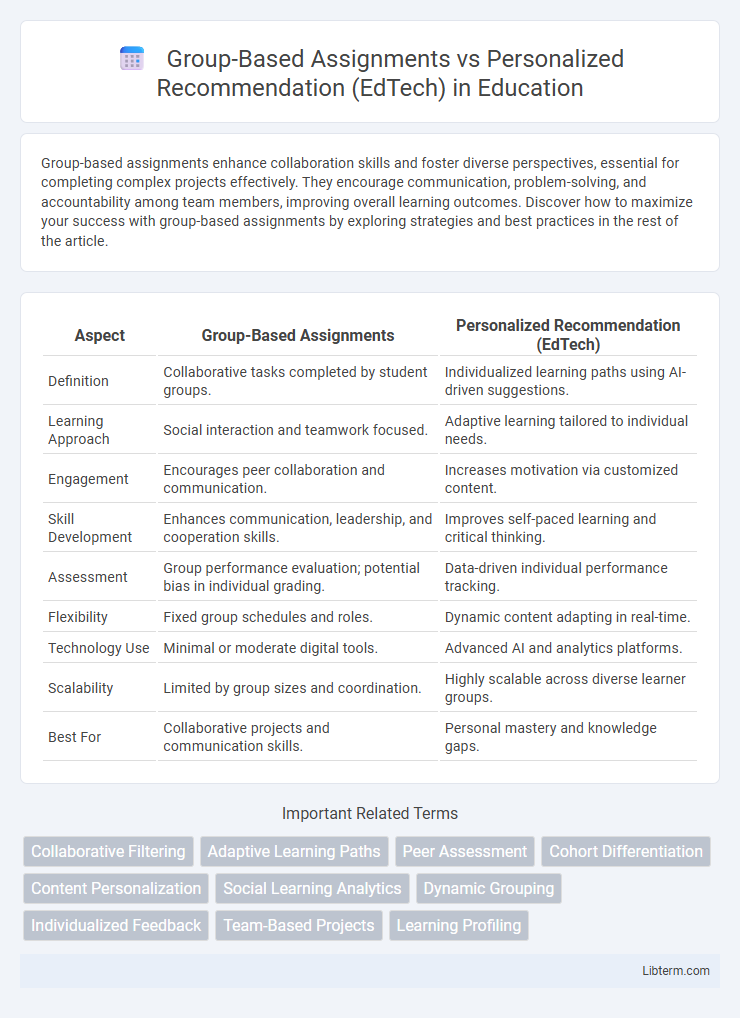Group-based assignments enhance collaboration skills and foster diverse perspectives, essential for completing complex projects effectively. They encourage communication, problem-solving, and accountability among team members, improving overall learning outcomes. Discover how to maximize your success with group-based assignments by exploring strategies and best practices in the rest of the article.
Table of Comparison
| Aspect | Group-Based Assignments | Personalized Recommendation (EdTech) |
|---|---|---|
| Definition | Collaborative tasks completed by student groups. | Individualized learning paths using AI-driven suggestions. |
| Learning Approach | Social interaction and teamwork focused. | Adaptive learning tailored to individual needs. |
| Engagement | Encourages peer collaboration and communication. | Increases motivation via customized content. |
| Skill Development | Enhances communication, leadership, and cooperation skills. | Improves self-paced learning and critical thinking. |
| Assessment | Group performance evaluation; potential bias in individual grading. | Data-driven individual performance tracking. |
| Flexibility | Fixed group schedules and roles. | Dynamic content adapting in real-time. |
| Technology Use | Minimal or moderate digital tools. | Advanced AI and analytics platforms. |
| Scalability | Limited by group sizes and coordination. | Highly scalable across diverse learner groups. |
| Best For | Collaborative projects and communication skills. | Personal mastery and knowledge gaps. |
Introduction: The Evolution of Assignment Strategies in EdTech
The evolution of assignment strategies in EdTech has shifted from traditional group-based assignments towards personalized recommendation systems powered by artificial intelligence and learning analytics. Group-based assignments encourage collaboration and peer learning, fostering social skills and collective problem-solving, while personalized recommendations tailor tasks to individual learning styles and proficiency levels, enhancing engagement and knowledge retention. Integrating adaptive technologies with collaborative elements creates a more dynamic and effective learning environment that addresses diverse student needs.
Understanding Group-Based Assignments
Group-based assignments in EdTech foster collaborative learning by enabling students to work together, share diverse perspectives, and develop teamwork skills crucial for real-world problem-solving. This approach leverages social interaction and peer-to-peer feedback, enhancing engagement and deeper comprehension of complex concepts. Effective group assignments integrate clear roles, communication tools, and assessment criteria to optimize collective knowledge construction and individual accountability.
Exploring Personalized Recommendation Systems
Personalized recommendation systems in EdTech leverage machine learning algorithms and student data to tailor learning experiences, enhancing engagement and knowledge retention. These systems analyze individual performance, preferences, and learning pace to deliver customized content, contrasting with uniform group-based assignments that often fail to address diverse learner needs. By adapting to each student's unique profile, personalized recommendations improve academic outcomes and foster continuous motivation.
Key Benefits of Collaborative Learning Models
Collaborative learning models in EdTech, particularly group-based assignments, enhance critical thinking and communication skills by encouraging peer-to-peer interaction and diverse perspectives. These models increase engagement and motivation as students actively participate in knowledge construction rather than passive consumption. Research shows that group-based collaboration fosters deeper understanding and retention compared to personalized recommendation systems, which primarily focus on individual learning paths.
Personalized Recommendations: Advantages for Individual Learners
Personalized recommendations in EdTech tailor learning experiences to individual needs, enhancing engagement and retention by providing content aligned with a learner's pace and skill level. Adaptive algorithms analyze performance data to identify strengths and weaknesses, delivering targeted resources that promote mastery and motivation. This individualized approach supports diverse learning styles and fosters self-directed growth more effectively than uniform group-based assignments.
Challenges of Group-Based Assignments in EdTech
Group-based assignments in EdTech often encounter challenges such as uneven participation, where some students contribute significantly less, impacting overall group performance and learning outcomes. Collaboration barriers arise due to differing schedules, communication preferences, and varying levels of tech proficiency among students, complicating effective teamwork. Assessing individual contributions within groups also remains difficult, leading to potential fairness issues in grading and feedback accuracy.
Potential Drawbacks of Personalized Recommendation Approaches
Personalized recommendation approaches in EdTech may lead to overfitting on individual learning preferences, limiting exposure to diverse perspectives and critical thinking skills. Privacy concerns arise from extensive data collection required to tailor content, risking unauthorized access or misuse of sensitive student information. Furthermore, algorithmic biases can perpetuate educational inequalities by reinforcing existing knowledge gaps instead of closing them.
Impact on Student Engagement and Motivation
Group-based assignments foster collaborative skills and peer interaction, enhancing student engagement through social learning dynamics and shared responsibilities. Personalized recommendations in EdTech tailor content to individual learning preferences and pace, significantly boosting motivation by addressing unique student needs and promoting autonomy. Both approaches improve engagement but personalized methods show higher effectiveness in sustaining long-term motivation by adapting to learners' evolving capabilities.
Choosing the Right Assignment Strategy: Factors to Consider
Choosing the right assignment strategy in EdTech depends on factors such as learner diversity, learning objectives, and available resources. Group-based assignments promote collaboration and peer learning, enhancing communication skills and collective problem-solving. Personalized recommendations tailor content to individual student needs, improving engagement and mastery through adaptive learning paths aligned with performance data.
Future Trends: Integrating Group Dynamics with Personalization in EdTech
Future trends in EdTech emphasize integrating group dynamics with personalized learning to enhance engagement and outcomes. Adaptive learning platforms are increasingly leveraging AI to tailor recommendations based on both individual progress and collaborative interactions within group assignments. This hybrid approach optimizes peer learning while addressing personalized knowledge gaps, driving improved academic performance and social skills development.
Group-Based Assignments Infographic

 libterm.com
libterm.com